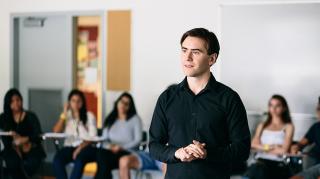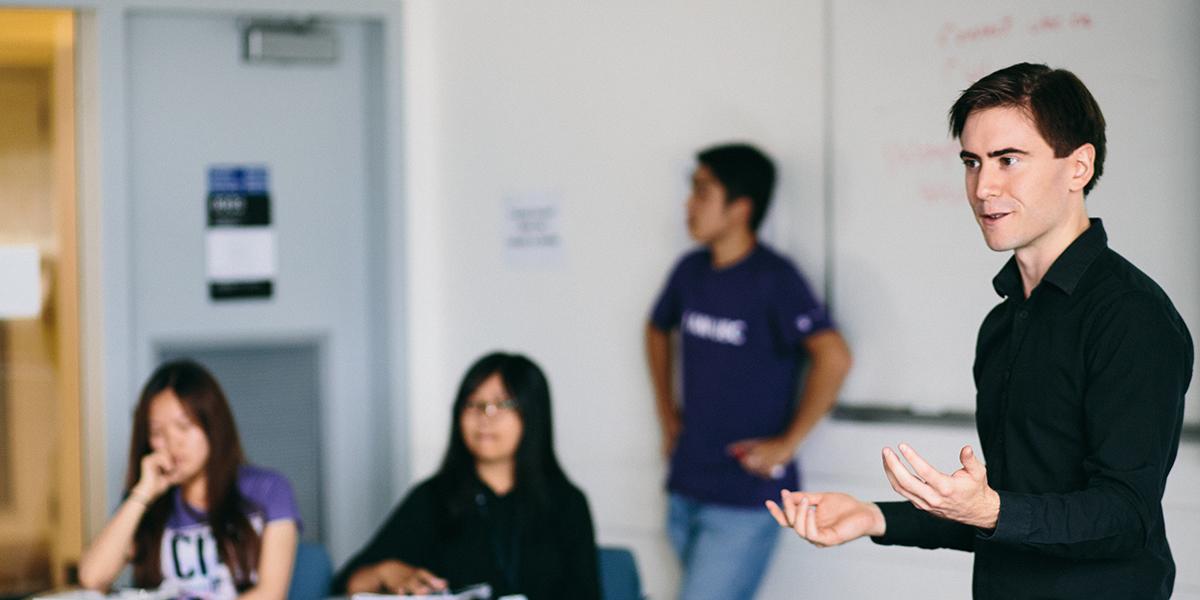Professor Michael Griffin's philosophical comparison


If you have an appetite for challenging the typical faculty/student interactions at UBC, you could do worse than spend an hour with Michael Griffin, Assistant Professor in the Department of Philosophy. Michael is at the forefront of a number of initiatives on our Vancouver campus, which are beginning to redefine the way these groups interact.
Michael’s recent research has focused on the early stages of philosophical education, in the ancient Greek and Roman world, leading him to draw a number of comparisons with his interests as a modern-day teacher.
He explains: “The development of the higher education system in ancient times was integrated with the question of how to create pro-social, caring, altruistic members of society.”
The development of the higher education system in ancient times was integrated with the question of how to create pro-social, caring, altruistic members of society.
Michael Griffin
Much of Michael’s ‘extra-curricular’ work at UBC is focused on initiatives that give students the tools to become just that in the modern world. One of them is Jump Start – a first-year transition program that immerses first-year international students in university life before classes start, through lectures, workshops and community-building activities. Michael is one of approximately 60 Faculty Fellows for the program, meaning he leads a small learning community of Arts students and steeps them in the culture of the Faculty.
“In addition to helping them prepare for the Canadian academic system, Jump Start helps students explore their passions and equip them with tools so they can bring those passions to life over the course of their degrees,” he says. “We invite them to see themselves as agents of their knowledge acquisition, rather than passive recipients.”
In Jump Start, students are grouped into small Faculty-specific learning communities, in which they live, learn and play. Michael’s interest in facilitating this kind of intimate learning environment draws heavily on his time at the University of Oxford, where he completed his graduate studies. “Oxford’s college system made the experience feel really humane like I was at school with 300 people, rather than thousands.”

Michael’s efforts to humanize the university experience go a step further. He is the first professor to live alongside students in residence, as part of the pilot ‘Faculty in Residence’ program.
He is about to enter his third year as a full-time resident of Totem Park. What compelled him to want to live with first year students, you may ask? “You mean, aside from the short commute?!
“This experience has had a profound impact on my skills as a teacher,” Michael explains. “Seeing how the Residence Life team interact with students is impressive. I’m constantly trying to model the great listening and communication skills they display everyday.
“Even more than that though, living in residence has given me the chance to learn about our students in a way I never could have before. Over dinner, we chat about how they’re doing, what’s working for them, what’s causing them stress. These focus group-type interactions have made it much easier to relate to the concerns of first year students, so I can be a much better teacher to them.”
Michael’s presence in residence means he can also introduce students to a range of academic perspectives. Every few weeks, he hosts a ‘prof talk’, during which professors and graduate students share their thoughts on a particular subject, from their unique disciplinary viewpoint. The theme this year was what an ideal world would look like in 50 years. Discussions on the subject covered aspects such as pharmacology, music and psychology. He concludes: “These multi-perspective conversations give students a well-rounded view on topics that transcends their particular area of focus – further helping them to be active and engaged members of society.”
Interested in learning more? Michael would love to hear from you.
Written by Megan Czerpak, UBC Internal Communications
Find the latest news, updates, events, and useful dates from across UBC, curated for faculty and staff by Internal Communications.
Access a library of resources from multiple UBC websites, all in one place.